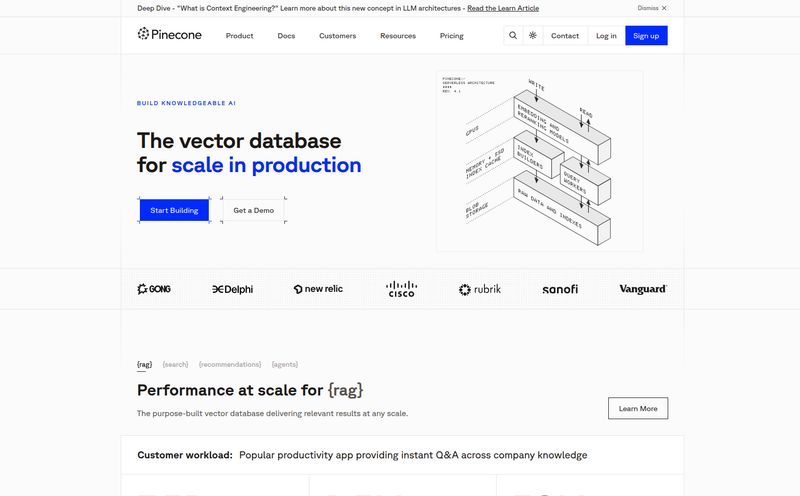If you've spent any time in the AI/ML space, you know the feeling. That sinking sensation when you're trying to figure out which of the 17 `model_final_test_v3.ipynb` notebooks produced that one magical result two weeks ago. It's a special kind of chaos, a digital wild west where insights are lost, experiments are impossible to reproduce, and collaboration feels more like a relay race where everyone drops the baton.
We’ve tried to tame it, of course. We brought in DevOps discipline for our infrastructure, and then MLOps came along to streamline the model lifecycle from training to monitoring. But there's always been a gap. A messy, creative, and utterly critical gap: the experimentation phase itself. This is where the real learning happens, and frankly, it's where most projects go off the rails.
So when I heard about a platform calling itself an “ExperimentOps studio,” my ears perked up. The platform is Remyx AI, and it’s not just another tool in the stack. It’s proposing a whole new category. But is it just clever marketing, or is this the lab manager we've all been secretly wishing for?
So, What on Earth is ExperimentOps?
Before we get into Remyx itself, we have to talk about this term they're championing: ExperimentOps. I've seen it pop up a few times, and Remyx seems to be planting its flag firmly on this hill. It's not DevOps. It's not quite MLOps. Think of it as the missing link.
- DevOps is about the infrastructure and code pipelines (CI/CD, uptime, reliability).
- MLOps is about the machine learning model's lifecycle (training, deploying, monitoring models).
- ExperimentOps, as Remyx defines it, focuses on the AI learning lifecycle. It’s less about the model as an artifact and more about the knowledge gained while building it. It’s for the AI and Product teams, not just the engineers. The goal is to increase learning velocity and ensure that experiments actually lead to better product decisions.
In my experience, this is the part everyone struggles with. It's the squishy, human part of AI development that standard Ops practices often miss. It’s about organizing the 'why' behind your work, not just the 'what'.

Visit Remyx AI
How Remyx AI Aims to Tame the Experimental Chaos
Okay, so Remyx AI positions itself as the home for ExperimentOps. Lofty goal. How does it actually do that? From what I've gathered, it boils down to a few core ideas that feel... refreshingly practical.
Making Your Experiments Structured and Reusable
This is the big one. Instead of one-off scripts and chaotic notebooks, Remyx encourages you to build experiments in a structured way. This means defining your hypotheses, datasets, and parameters cleanly from the start. The real kicker is that these become reusable components. Imagine being able to grab a previous experiment, tweak one variable, and run it again, knowing everything else is consistent. That’s the dream, right? It turns the mad scientist’s lab into a proper R&D facility.
Finally, Customizable Evaluation That Makes Sense
Another pain point I see constantly is evaluation. Teams get fixated on generic metrics like accuracy or F1-score, even when they don't map to the actual business goal. Remyx allows for customizable evaluation criteria. This means you can define what “success” looks like for your specific problem, incorporating business logic, fairness checks, or user experience metrics right into the experiment itself. This closes the loop between technical results and actual product impact.
Guided Learning Loops and A Single Source of Truth
The platform isn’t just a repository. It pushes you through “guided learning loops.” It captures the results, surfaces the insights, and helps your team decide on the next steps. Everyone—from the ML engineer to the product manager to the business stakeholder—is looking at the same data, the same results, the same history. It becomes the shared source of truth for your AI development, which can do wonders for team alignment and cuts down on those endless meetings where everyone is arguing with different data.
The Good, The Bad, and The Realistic
No tool is a silver bullet, and I'm always skeptical of platforms that promise to solve everything. After digging in, here’s my honest take on the pros and the potential hurdles with Remyx AI.
On the upside, the focus on learning velocity is a huge win. Speeding up the feedback loop between an idea and a validated insight is probably the highest-leverage thing any AI team can do. The emphasis on reproducibility and scalability is also critical for any team that wants to move beyond proof-of-concept models. And the collaborative aspect... it’s huge. It transforms AI development from a solo sport into a team effort. It’s like giving an orchestra a conductor instead of letting every musician play from their own sheet music.
Now, for the reality check. A platform this integrated will require some initial setup. You can't just drop it in and expect magic. It requires a change in process, getting your team to adopt a more structured approach to experimentation. That takes effort. You're also building a certain reliance on the platform for tracking and managing your experiments. That's not necessarily a bad thing—it's the point, after all—but it's a commitment you need to be ready for.
Let's Talk Money: Remyx AI Pricing
For a while, pricing seemed to be a bit of a mystery, but it looks like they’ve become more transparent. This is always a good sign. They offer a tiered model, which seems pretty standard for SaaS platforms in this space. Here’s a quick breakdown as I see it.
| Plan | Price (per month) | Who It's For | Key Features |
|---|---|---|---|
| Basic | $49 USD | Individuals or small teams starting with NLP projects. | Text preprocessing, Sentiment analysis, NER, PoS tagging. |
| Elite | $99 USD | Growing teams that need more advanced generation and analysis. | Everything in Basic, plus Text generation, Keyword extraction, and Summarization. |
| Pro | $199 USD | Serious teams and companies scaling complex AI systems. | Everything in Elite, plus Topic modeling, Spell checking, and Text similarity comparison. |
The features listed seem heavily focused on Natural Language Processing tasks. This is an interesting specialization, and if you're in that domain, these tiers make a lot of sense. For more information, you should probably check their official pricing page for the latest details.
My Final Take: Is Remyx AI Worth the Hype?
So, what’s the verdict? I think Remyx AI is on to something important. The problem they're solving is very, very real. The productivity and insights lost to disorganized R&D in AI are immense. By carving out the niche of ExperimentOps, they are putting a name to a pain that many of us have felt but struggled to articulate.
This isn't a tool for the casual hobbyist playing with a model on a weekend. This is for professional teams who are feeling the growing pains of scaling their AI efforts. It's for companies where the cost of a bad decision, or a six-week delay because an experiment couldn't be reproduced, is starting to really hurt. If your team is still living in that wild west of notebooks and shared drives, and you know there has to be a better way, then yes, I think Remyx AI is absolutely worth a serious look. It might just be the thing that brings some much-needed order to the beautiful chaos of AI creation.
Frequently Asked Questions
- 1. What is ExperimentOps, really?
- Think of it as a discipline focused on the AI learning and experimentation lifecycle. While MLOps manages the deployed model, ExperimentOps manages the knowledge, insights, and decisions that lead to that model. It's about making the R&D process itself more efficient and repeatable.
- 2. Does Remyx AI replace tools like MLflow or Weights & Biases?
- Not necessarily. While there's some overlap, tools like MLflow are often more focused on tracking metrics and artifacts. Remyx AI aims to be a higher-level studio that manages the entire experimental process, including the hypothesis, collaboration, and decision-making loop. It integrates with various tools, so it can work alongside your existing stack.
- 3. Is Remyx AI hard to set up?
- There's an initial effort, as with any powerful platform. The main challenge isn't technical integration so much as team adoption. It requires a mindset shift towards more structured experimentation, but the long-term payoff in clarity and speed is the main selling point.
- 4. What kind of team gets the most out of Remyx AI?
- Teams that have moved beyond one-off models and are trying to build a scalable, reliable AI function. If you have product managers, data scientists, and ML engineers all trying to collaborate on AI features, you're the prime audience. Especially if you're feeling the pain of lost work and slow decision-making.
- 5. Is there a free trial for Remyx AI?
- The pricing table shows paid plans, but many SaaS companies offer trial periods or demos. Your best bet is to visit their website and check for a "Book a Call" or "Request a Demo" option to see the platform in action and ask about trial possibilities.



